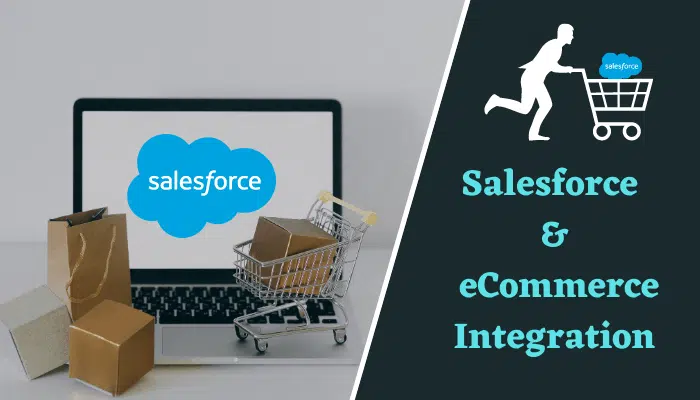When it comes to choosing a firm in the dynamic eCommerce landscape, most buyers believe that these interconnected procedures are critical.
As a result, all organisations aiming to attract today’s connected customers must standardise their experiences across all touchpoints.
Customers can have a totally seamless retail experience from discovery through delivery and beyond with Salesforce eCommerce integration.
Brands may have a clear knowledge of customer activity and how it relates to retail inventory, products, and promotions with a unified customer experience.
Any eCommerce platform with good user experience design may make a brand’s online store simple to access and explore.
If you’re already using Salesforce as your CRM, integrating eCommerce with it can improve customer experiences. Salesforce eCommerce integration is much easier to create effective marketing campaigns and also provides tailored purchasing experiences when your eCommerce platform is integrated into your CRM and database.
Read Also BigCommerce vs Shopify Comparison
Salesforce eCommerce integration
Image Credits: Gigmind
It can be done in two different ways:
1) connecting Salesforce CRM to a distinct eCommerce platform like BigCommerce web design company via third-party plugins
2) implementing Salesforce Commerce Cloud.
Third-Party Plugins Integrations For Salesforce Commerce Cloud Integrations
Consider using third-party integrations to integrate your existing eCommerce platform with Salesforce if you’re comfortable with it.
These are some instances of connectors:
- CRM Perks’ Salesforce Sync: This Shopify integration transfers your business orders and customers to your Salesforce account automatically.
- Webkul Software Private Limited’s Salesforce Connector: This plugin allows users to connect Magento Store Data with Salesforce including the customers, categories, goods, and orders.
- Zapier: The app integrator Zapier offers various Shopify + Salesforce and Magento + Salesforce processes. These workflows allow you to seamlessly sync information from Salesforce to your eCommerce platforms, such as customers, orders, and goods.
Third-party integrations, on the other hand, can be fairly limiting when it pertains to synchronizing data between multiple platforms. For example, certain solutions do not support two-way synchronisation.
Other plugins, on the other hand, can only sync with specific Salesforce products. They can link to Salesforce Marketing Cloud, but still not Salesforce Analytics Cloud, for example, which becomes a problem as you scale.
If you’re using multiple Salesforce products and need a deep integration with your eCommerce platform, you have three options: build a custom plugin either in-house or with a system integrator, use Salesforce Commerce Cloud integration to migrate to a more flexible and connected solution with microservices.
Salesforce Commerce Cloud
Salesforce Commerce Cloud is platform that offers Salesforce B2C Commerce and Salesforce B2B Commerce integrations, as well as an orders management function that allows businesses to sell and fulfil orders across different channels.
Commerce Cloud integrates seamlessly with Salesforce’s CRM and other products, providing a unified perspective of all your business customer data.
When combined with other Salesforce products, Commerce Cloud can help you accelerate your sales, advertising, and customer service activities.
Connecting Commerce Cloud and Sales Cloud, for example, allows you to provide rich and specific customer data to your sales and support teams, such as purchasing habits, open service issues, and more. This allows them to better understand your consumers and provide customized services.
Determining the Best Option For Your Business: Which Integration is Better For You.
You don’t have to use Commerce Cloud or use an eCommerce plugin to integrate Salesforce CRM with your online store. It’s also possible to create or licence eCommerce services like PIM, OMS, and pricing, and then link them with Salesforce via APIs.
This requires more work upfront, but it allows you to swiftly adapt to new shopping expectations, trends, and behaviours without relying on glue code or dubious Salesforce AppExchange connectors.
Now, the question that arises is ‘which Salesforce eCommerce integration is more beneficial to your company? And the answer couldn’t get any simpler than this ‘the “correct” response is determined by your needs, existing procedures and systems, as well as your future roadmap and growth ambitions.’
Salesforce eCommerce Integration From Microservices
The fact that Salesforce Commerce Cloud development operate as monolithic eCommerce platforms is a key drawback.
This means that your catalogue, order management, and CRM are all part of the same code base. Monolithic architecture may appear simple and easy to use at first, but as you scale, it becomes slow and complex to manage.
A preferable option is to build or adapt the exact eCommerce services you require, then connect them to Salesforce via the Lightning Platform REST API.
You might want to deliver the most relevant data to Salesforce CRM without relying on untrustworthy apps by leveraging these APIs, utilising eCommerce APIs, and setting up an API gateway.
Why Should Companies Go For Salesforce eCommerce Integration?
Customers should be able to engage with businesses effortlessly across all of their chosen channels, including social, mobile, and physical existence.
An online eCommerce business should be integrated with marketing, logistics, inventory management, and back-end accounting systems to provide this kind of consumer experience.
The majority of traditional commerce platforms are incapable of handling this level of eCommerce integration.
Salesforce Commerce Cloud is a world-class platform for eCommerce integration for both B2B and B2C organisations.
It offers a multi-tenant cloud architecture that provides merchants with the scalable, dependable, and secure technologies they need to compete in a rapidly changing retail industry.
The Commerce Cloud unifies purchasing experiences across all channels while optimising all operations from discovery to fulfilment and beyond. It’s simple to connect eCommerce behind the scenes with consistent information across stores, interactions, customers, orders, items, inventory, pricing, and more with the Commerce Cloud.
This simple eCommerce connection also connects in-store mobile channels to basic eCommerce capabilities and services like transaction management and merchandising.
Ultimately, the Salesforce Commerce cloud consultants architecture allows you to quickly and easily create a commerce platform and shopping experience tailored to your individual requirements.
You’re not reliant on a single provider or platform. Instead, you can use APIs to access numerous providers and services. This finally aids in the scalable integration of eCommerce with Salesforce.
Benefits of Integrating Salesforce and eCommerce Together?
True eCommerce integration allows merchants to remain connected to customers wherever they buy and easily innovate throughout the whole customer experience.
Salesforce’s eCommerce integration capability brings together digital commerce, retail operations, order administration, and AI-powered personalisation into a single, unified commerce platform. eCommerce businesses can perform the following with Salesforce.
- They can deliver a strategic and personalized shopping experience at each step and on any device.
- Businesses can roll out continuous innovations with any kind of dependencies, disruptions, and delays.
- Businesses can launch new websites in weeks and new promotions within minutes.
- Salesforce makes it possible to unify digital commerce with store operations, order management, and more.
- It becomes possible to offload IT operations for a unified cloud that is scalable, robust, and stable.
- Salesforce helps in maximizing productivity with centralized site management and automated tasks.
- It is possible to explore new regions easily and go global in record time.
Wrapping Up
Salesforce can help with all aspects of the customer journey, including sales, marketing, customer support, communities, and more.
It is one of the world’s most popular customer relationship management systems, with trailblazing customers, knowledgeable partners, and software platforms like Service Cloud, Marketing Cloud, and Sales Cloud.
All of which integrate with Commerce Cloud to take over the entire customer journey from awareness to purchase and customer loyalty.
Hence, Salesforce eCommerce integration for eCommerce businesses becomes a must so that it can unify its customer experiences with agility, authenticity, and scalability.
With the integration of Salesforce eCommerce integration, businesses can unlock revenue across channels with customizable commerce experiences.
FAQs
What is Salesforce Commerce Cloud?
Commerce Cloud is a multi-tenant, cloud-based commerce platform that enables organisations to build intelligent, unified purchase experiences across all the available touchpoints; like mobile, social, online, and store, for their customers.
Does BigCommerce integrate with Salesforce Commerce Cloud?
Yes, BigCommerce does integrate with Salesforce commerce cloud. It provides a unified Salesforce platform for e-Commerce and CRM data management. To get CRM benefits, you synchronise BigCommerce data with Salesforce.
It offers a Salesforce-centric configuration which provides a hassle-free environment. You also get category synchronisation from BigCommerce to Salesforce.
It caters to orders and product synchronisation is necessary for good inventory management.
At the Salesforce end, customers are synchronised as Accounts and Contacts. You get to sync Guest Checkout with all User and Order information. Lastly, at the Salesforce end, interactive design with the user interface adds to effective data use.
What is Salesforce eCommerce?
Salesforce eCommerce integration is a cloud-based commerce platform that includes a variety of out-of-the-box features, useful tools, and commerce portals to help you expand your online business.
It helps you to simplify the purchasing process, personalise the shopping experience, and create a mobile-friendly shopping environment.
What is Salesforce B2B Commerce integration?
Salesforce B2B Commerce integration allows businesses to develop eCommerce storefronts tailored to large-volume online purchases from other businesses. Customers in B2B commerce require convenient online access to suppliers in order to purchase products for their enterprises.








